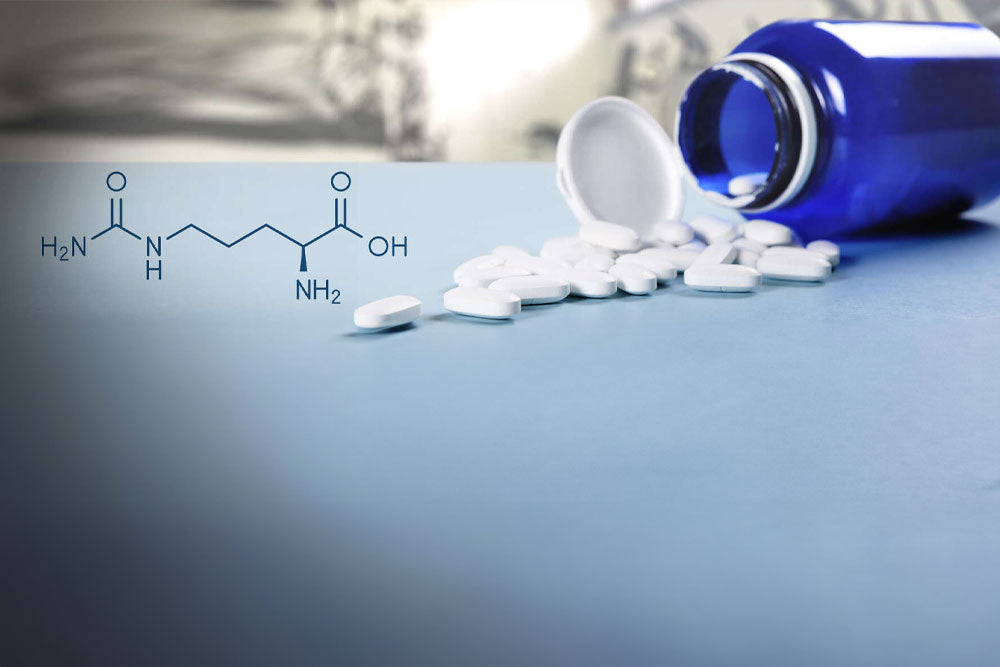

L-Citrulline vs Citrulline Malate: Which One Helps with Muscle Growth and Strength?
Table of Contents
With so many supplements available in the market, it can get confusing to decide which supplement is ideal for muscle growth and strength. One of the most common amino acids known to bodybuilders and athletes is L-citrulline. It is an essential amino acid that our bodies cannot produce on its own. This amino acid is involved in protein synthesis, blood flow, and energy production. It has numerous health benefits, too. Let’s find out how it helps build muscle and why you should include it in your supplement stack.

What is L-Citrulline?
L-citrulline is an amino acid found in dietary supplements and to boost the levels of arginine in the body. It has been associated with nitric oxide production and ammonia metabolism, two important processes that enhance muscle protein synthesis and improve athletic performance.
L-citrulline can be found in two forms: L-citrulline and citrulline malate, a salt form combined with malic acid. Both amino acids have similar effects on nitric oxide production and ammonia metabolism, but citrulline malate may be more effective at improving endurance exercise performance.
Studies have shown citrulline supplementation improves high-intensity exercise performance, especially among endurance athletes. However, more research is needed to determine the optimal protein synthesis and performance goals for citrulline supplementation.

What is Citrulline Malate?
Citrulline malate is a combination of the amino acid l-citrulline and malic acid salt. citrulline malate increases nitric oxide production, leading to more blood flow into muscles, which increases performance during exercise. citrulline malate also improves muscle endurance and recovery, which can help athletes perform at peak levels for longer periods of time. citrulline malate is known to increase time to exhaustion during exercise, making it an effective supplement for athletes seeking an energy boost during intense workouts.
However, citrulline malate supplements without the malic acid may have similar benefits, but the effects of citrulline malate on energy production aren’t as profound.
Differences between L-Citrulline and Citrulline Malate
L-Citrulline and Citrulline Malate are two forms of the non-essential amino acid citrulline. Both forms have gained popularity as dietary supplements due to their purported benefits for athletic performance and cardiovascular health. While L-Citrulline and Citrulline Malate share the same basic structure, they differ in their chemical composition, absorption, and effects on the body.
- Chemical Composition:
L-Citrulline is a free-form amino acid, meaning it exists as a single molecule. Its chemical structure consists of a citrulline molecule with an amine group (-NH2) at one end and a carboxylic acid group (-COOH) at the other end. L-Citrulline is produced naturally in the body as an intermediate in the urea cycle, which converts ammonia into urea for excretion.
Citrulline Malate, on the other hand, is a compound that combines L-Citrulline with malic acid, a dicarboxylic acid that plays a role in energy production in the body. The most common form of Citrulline Malate is a 2:1 ratio of L-Citrulline to malic acid. This combination results in a molecule that has both the benefits of citrulline and malic acid.
- Absorption and Metabolism:
L-Citrulline is absorbed into the bloodstream through the small intestine and transported to the kidneys and other tissues. It is metabolized in the kidneys into L-arginine, another amino acid that is involved in the production of nitric oxide (NO) in the body. Nitric oxide is a molecule that helps to dilate blood vessels, increasing blood flow to tissues and organs.
Citrulline Malate is also absorbed into the bloodstream through the small intestine, but its absorption is slower and more sustained than that of L-Citrulline. Once in the bloodstream, Citrulline Malate is broken down into L-Citrulline and malic acid. The L-Citrulline is then metabolized into L-arginine and NO in the same way as L-Citrulline alone.
- Effects on Athletic Performance:
Both L-Citrulline and Citrulline Malate have been studied for their potential to enhance athletic performance. The primary mechanism by which they are thought to do this is by increasing blood flow and oxygen delivery to working muscles.
Several studies have found that supplementation with L-Citrulline can increase exercise performance by reducing fatigue and improving endurance. A study published in the Journal of Strength and Conditioning Research found that a single dose of L-Citrulline (8g) improved cycling performance and reduced muscle soreness in trained cyclists.
Another study published in the Journal of the International Society of Sports Nutrition found that daily supplementation with L-Citrulline (6g/day) for 15 days improved endurance performance in male cyclists.
Similarly, Citrulline Malate has also been shown to improve exercise performance. A study published in the European Journal of Applied Physiology found that supplementation with Citrulline Malate (8g/day) for 15 days improved cycling performance and reduced muscle soreness in male cyclists. Another study published in the Journal of Strength and Conditioning Research found that Citrulline Malate supplementation (8g/day) improved upper body resistance exercise performance in male weightlifters.
Overall, both L-Citrulline and Citrulline Malate have been found to have similar effects on exercise performance, although the optimal dosage may vary depending on the individual and the type of exercise performed.

Benefits of L-Citrulline and Citrulline Malate for Muscle Growth and Strength
- Increased Blood Flow and Nutrient Delivery
One of the key benefits of L-citrulline and citrulline malate is their ability to increase blood flow and nutrient delivery to the muscles. This is because both supplements increase the production of nitric oxide, a molecule that relaxes and widens blood vessels, allowing for more efficient delivery of oxygen and nutrients to the muscles. A study published in the Journal of Strength and Conditioning Research found that athletes who took citrulline malate experienced an increase in blood flow and nutrient delivery to the muscles, which led to improved muscle performance during high-intensity exercise.
- Improved Endurance and Performance
L-citrulline and citrulline malate have also been shown to improve endurance and performance during exercise. A study published in the Journal of the International Society of Sports Nutrition found that athletes who took citrulline malate were able to perform more repetitions during resistance training exercises and experienced less muscle soreness after exercise. Another study published in the Journal of Strength and Conditioning Research found that athletes who took citrulline malate experienced an increase in energy levels and a delay in fatigue during high-intensity exercise.
- Increased Muscle Protein Synthesis
Muscle protein synthesis is the process by which the body builds new muscle tissue. L-citrulline and citrulline malate have been shown to increase muscle protein synthesis, which can lead to increased muscle growth and strength. A study published in the Journal of the International Society of Sports Nutrition found that athletes who took citrulline malate experienced an increase in muscle protein synthesis after resistance training exercise.
- Reduced Muscle Soreness and Fatigue
Muscle soreness and fatigue are common side effects of high-intensity exercise. L-citrulline and citrulline malate have been shown to reduce muscle soreness and fatigue, allowing athletes to recover more quickly from exercise and perform at a higher level. A study published in the Journal of Strength and Conditioning Research found that athletes who took citrulline malate experienced less muscle soreness and fatigue after high-intensity exercise.
Scientific Proofs
L-Citrulline and Citrulline Malate are amino acids that are converted to arginine in the body. Arginine is a precursor to nitric oxide, a molecule that helps to dilate blood vessels and improve blood flow. Improved blood flow can lead to better nutrient and oxygen delivery to the muscles, which can in turn enhance muscle growth and strength.
One study published in the Journal of Strength and Conditioning Research found that Citrulline Malate supplementation improved muscular endurance in weightlifters. The study involved 41 trained men who were randomly assigned to either a Citrulline Malate group or a placebo group. Participants in the Citrulline Malate group showed significant improvements in the number of repetitions performed during a bench press and leg press test.
Another study published in the International Journal of Sports Nutrition and Exercise Metabolism found that L-Citrulline supplementation improved muscle protein synthesis in healthy men. Muscle protein synthesis is the process by which the body builds new muscle tissue. The study involved 20 healthy men who were randomly assigned to either an L-Citrulline group or a placebo group. Participants in the L-Citrulline group showed significantly higher rates of muscle protein synthesis than those in the placebo group.
In addition to its effects on muscle growth and strength, Citrulline Malate has also been shown to have beneficial effects on fatigue and recovery. One study published in the Journal of Strength and Conditioning Research found that Citrulline Malate supplementation reduced muscle soreness and improved recovery following a high-intensity resistance training session. The study involved 12 men who were randomly assigned to either a Citrulline Malate group or a placebo group. Participants in the Citrulline Malate group reported significantly less muscle soreness and had better muscle recovery than those in the placebo group.
The scientific and researched-based evidence suggests that L-Citrulline and Citrulline Malate supplementation can have beneficial effects on muscle growth, strength, and recovery. However, it is important to note that supplementation alone is not enough to achieve significant muscle growth and strength gains. A well-rounded exercise program, proper nutrition, and adequate rest are all crucial factors for maximizing muscle growth and strength.
L-Citrulline vs Citrulline Malate: Which One Helps with Muscle Growth and Strength?
Several studies have compared the effects of L-citrulline and citrulline malate on muscle growth and strength. One study published in the Journal of Strength and Conditioning Research found that citrulline malate supplementation improved upper body power and muscular endurance in resistance-trained men, while L-citrulline supplementation had no significant effect.
Another study published in the International Journal of Sports Nutrition and Exercise Metabolism found that L-citrulline supplementation improved muscle protein synthesis, a key process involved in muscle growth, in healthy adults. However, this study did not compare the effects of L-citrulline to citrulline malate.
Overall, it appears that both L-citrulline and citrulline malate may have beneficial effects on muscle growth and strength, but they may work through slightly different mechanisms. Citrulline malate may be particularly effective for improving energy production and reducing fatigue during exercise, while L-citrulline may be more effective for improving blood flow and muscle protein synthesis.
One study published in the Journal of Strength and Conditioning Research compared the effects of L-Citrulline and Citrulline Malate supplementation on muscle strength in male weightlifters. The study found that both forms of citrulline improved upper body strength and reduced muscle soreness, but there was no significant difference between the two supplements.
Another study published in the European Journal of Applied Physiology examined the effects of Citrulline Malate supplementation on muscle protein synthesis in healthy young men. The study found that Citrulline Malate increased muscle protein synthesis rates at rest, but did not enhance muscle protein synthesis in response to resistance exercise.
It is important to note that the optimal dose and timing of citrulline supplementation may vary depending on individual factors such as age, sex, and training status. As with any supplement, it is best to consult with a healthcare professional before starting citrulline supplementation.
Let’s Sum Up
While both citrulline malate and l-citrulline are nitric oxide precursors and essential for muscle health, l-citrulline is a more effective supplement of the two. The supplement is water-soluble and readily passes through the blood-brain barrier to supplement citrulline levels in the brain. L-citrulline supplementation can help improve exercise performance by lowering muscle soreness, fatigue, and workout-induced fatigue. It also helps increase endurance performance and reduce muscle soreness after exercise.

















